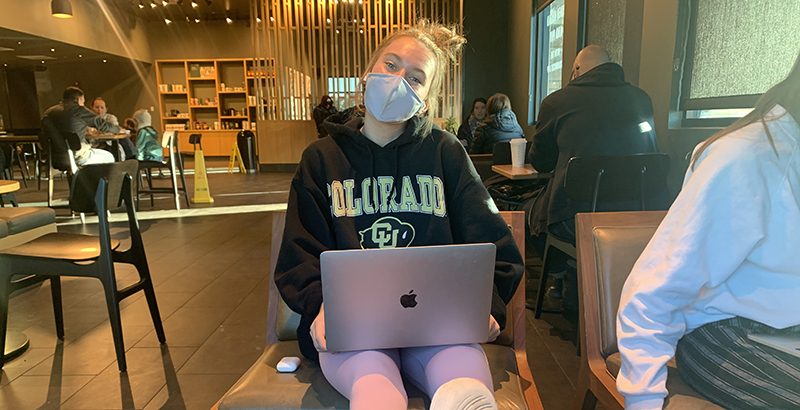Dear Adult Leaders: The Fear of Speaking Out About Mental Health Is Persistent. We Need to Reach Out to Each Other

This piece is part of “Dear Adult Leaders: Listen to Youth,” a four-week series produced in collaboration with America’s Promise Alliance to elevate student voices in the national conversation as schools and districts navigate how to educate our country’s youth in a global pandemic. In this series, students write open letters to adult leaders and policymakers about their experiences and how, from their perspectives, the American education system should adapt. Read all the pieces in this series as they are published here. Read our other coverage of issues affecting young people here. This week’s letters focus on the issue of supporting students’ mental wellbeing, particularly through the COVID-19 pandemic.
To teachers, education leaders and my fellow students,
As a high school student, I will never be able to fully understand the hard work it takes to be an educator during the pandemic. There is no question that my life has been impacted heavily by your teaching and guidance, and I cannot thank you enough. Having to stay afloat in the midst of it all is difficult, and it continues to take a toll on everyone’s mental health. As we continue adjusting to a new way of teaching and learning in this unprecedented time, COVID-19 has put both teachers and students in a similar position of confusion, self-discovery and struggle. Through this time, it’s important that teachers and students alike remember to support and check in with each other.
While I can’t imagine the perspective of being a teacher during the pandemic, the perspective of students like me towards the issues of mental health during this time is one I know very well. In the beginning, spring lockdown wasn’t terrible for me. I was in a high school relationship, was getting closer with my family, and enjoyed the comfort of being at home and not missing out on anything. However, it went from an extended spring break to being stuck at home, deciding between safety and missing out on events with friends as people started to break from being homebound.
The 2020-2021 school year has been the most difficult. A few weeks ago, I had to go into quarantine because I was exposed to COVID-19 at volleyball practice. I stayed in my room for days. The most human interaction I got was when my parents would drop my meals off at my door. It was taxing and I found myself going crazy by the end of it. I had no motivation to do my work, and was having a really hard time living with only my own thoughts and feelings all day, every day. I missed two of my classes that week, but no one really seemed to notice. New classes started, sports came back, and people started to ignore the idea of “safer at home.” The difficulty lies in knowing subconsciously that, even when you are struggling, it’s difficult to reach out because everyone else is struggling, too. Experiences similar to mine are, I’m sure, happening to students everywhere. Even in my small, 600 student or so high school, I know of only one teacher who has checked in with his students about how we’re doing.
A new stigma around mental health has awakened because of the COVID-19 lockdowns. Everyone’s mental health has been impacted in one way or another, but the fear of speaking out about it is stronger than before. As a student, I feel like since I am not suffering the worst consequences of the coronavirus, why should I reach out? When people are dying, why should I be asking for help with my boiled-down anxiety about the pandemic, falling behind in school or trying to achieve my dreams of becoming a college athlete?
Having to stay on Zoom, sometimes with people we’ve never met, and having to seamlessly adjust to a whole new form of human interaction and learning has thrown a lot of students into heightened anxiety, stress and, in some cases, depression. While I can’t fully relate to a teacher’s experience, I’m sure it’s very similar.
Although it feels rudimentary, the biggest ask I have for teachers is to reach out to students. School social workers, administrators, teachers and students can all be aware and engage in conversations about mental health. Whether it’s a survey in class, a direct email to a fellow teacher or student, or making resources like clubs, people to talk to, or areas for students to find out more about mental health and coping during quarantine, more available to all of the above. It’s so simple, but can help everyone. I also need to do my part. I know as a student it’s easy to place blame on those above us, but that doesn’t make it okay. We’re all humans who are trying our best.
To students, teachers, leaders, and other educators, even without additional resources and structured programs to support mental wellbeing, we can all do our best by just asking once in a while, “How are you doing?” “Is everything OK at home?” “How is school going for you?” While so simple, it is the most important step to keeping all of us happy and healthy during this time.
We can’t understand each other completely, but being there for each other, in any way possible, is the best we can do.
Your fellow quarantiner,
Cecile Stone, 16
Peak Charter School
Broomfield, Colorado
This series highlighting the perspectives of American youth is in part sponsored by Pure Edge, Inc., a foundation that equips educators and learners with strategies for combating stress and developing social, emotional and academic competencies.
Get stories like these delivered straight to your inbox. Sign up for The 74 Newsletter

;)
